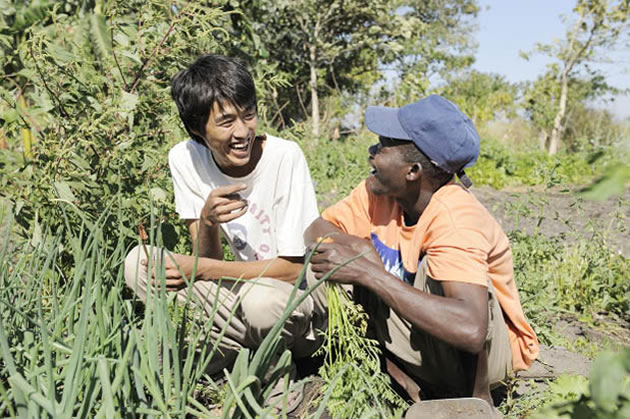1. Japanese Society and Japanese Citizens Deepening Their Ties with the World
Increasing the number of people traveling to and from Japan could generate positive impact such as stimulating the economy and promoting mutual understanding among different cultures. Based on this view, the Ministry of Foreign Affairs of Japan places a premium on facilitating the entry and stay of foreign nationals in Japan, stimulating various types of exchange, and having various types of Japanese individuals and groups participate in international exchanges.
The number of foreign nationals entering Japan exceeded 9.4 million in 2010, nearly twice the level in 2000 (about 5.27 million). The number of foreign nationals residing in Japan for a long-term (registered foreign nationals) was about 2.1 million at the end of 2010, which is about 1.3 times as many as in 2000 (about 1.7 million).
While it is important to promote the entry of foreign nationals into Japan, it is necessary to prevent the entry of persons who could be harmful to the interests of Japan. Foreign nationals entering Japan need valid passports and visas1. Visas are issued at Japanese diplomatic missions (embassies and consulates-generals) with no probable harms to immigration control. Foreign nationals entering Japan with visas must undergo an immigration inspection at the ports of entry into Japan and show valid passports and visas. In this way, a judgment on permitting foreign nationals to enter Japan is made by issuing visas and immigration inspections. In response to the increase of foreign nationals visiting Japan in recent years, the Ministry is working to expedite visa issuing procedures to individuals entering Japan for the purpose of business or tourism.
The Ministry has begun waiver of visa fees for foreign nationals visiting Iwate, Fukushima, and Miyagi Prefectures, which were damaged particularly severely from the Great East Japan Earthquake in order to support those areas. Furthermore, “Okinawa multiple-entry visas” to Chinese nationals visiting Okinawa has started since July 2011. As a result, the number of visa issuance for Chinese individual tourists visiting Okinawa from July through December 2011 grew by roughly 38 times from the same period in 2010, to approximately 8,900. Furthermore, based on “The New Growth Strategy” approved by the Cabinet in June 2010, the Ministry newly introduced “Visa for Medical Stay in Japan” from January 2011 to make it easier for foreign nationals to visit Japan for medical treatment purposes.
As the number of long-term foreign residents in Japan increases, various problems are emerging domestically in such fields as education, employment, and housing. To tackle these issues, the Ministry held the second international workshop in February 2011, following the first held in 2010, together with local governments, the International Organization for Migration (IOM), and other bodies. This workshop featured discussions about “Focus on the future policy of Japan for foreign nationals”, which was intended to raise awareness in this area.
As part of efforts to develop “All-Japan” diplomacy that utilizes the strengths of nongovernmental actors, the Japanese government for example is working to enhance cooperation with non-governmental Organizations (NGOs) as important actors in international cooperation. NGOs’ importance is growing in recent years as bodies providing assistance to developing countries in view of rising public interest in international cooperation. Japanese NGOs are implementing careful attentive assistance attuned to local residents’ needs for poverty reduction and humanitarian assistance, primarily in Asia but also in other regions of the world including Africa and the Middle East. Based on their knowledge of subjects such as the present conditions of developing countries, NGOs are engaged in a wide range of activities in addition to on-site assistance, forming NGO networks and making policy recommendations in various fields like human rights, education, health, and the environment.
The Japan Overseas Cooperation Volunteers (JOCVs) and Senior Volunteers (SVs) are also important players in international cooperation, working toward the resolution of problems that developing countries face by striving together with local people. These volunteers are visible representation of Japan’s ODA in developing countries and widely appreciated around the world, playing significant roles in promoting economic and social development of these countries, and fostering mutual understanding and friendship between Japan and developing countries. The knowledge and experience that returning volunteers bring back to Japanese society is also bearing fruit. To ensure better JICA’s volunteer programs, a new policy was announced in July 2011 under the title “Grassroots Diplomats: For Better Collaboration and the Bonds of Friendship- Japan’s Overseas Volunteer Program”, and efforts are being made toward this policy’s realization including review of its system.
Local governments and communities play a major role in fostering good international relations across a wide range of fields. In recent years, local governments, organizations, and citizens have been actively engaged in diverse activities that are earning a high degree of recognition in the international community. Local governments and communities are playing an extremely important role as diplomatic actors promoting international mutual understandings, building trust-based relationships, and strengthening the Japan brand.
In light of these circumstances, the Ministry regards local governments and communities as important partners in promoting diplomacy, and it aims to work with them to direct all-Japan efforts toward enhancing the country’s comprehensive diplomatic capacity. The Ministry implements various cooperative measures with local governments and other concerned parties to achieve those goals, placing particular emphasis on (1) communicating the attractions of local communities to the world, (2) supporting the internationalization of local communities, and (3) providing a broad range of information on international exchanges. Particularly important issues are those of supporting communities in countering damage by harmful rumors resulting from the Great East Japan Earthquake and support for revitalization of local industry and local economies, and the Ministry is implementing diverse efforts in support of an “open reconstruction” within international markets.
1 Nationals of countries with which the Government of Japan has concluded visa exemption agreements, do not need visas to enter Japan.

A member of Young Japan Overseas Cooperation Volunteers (JOCV) instructing rice and edible crop cultivation
methods at an experimental center for rice cultivation (Malawi, photo: JICA)
